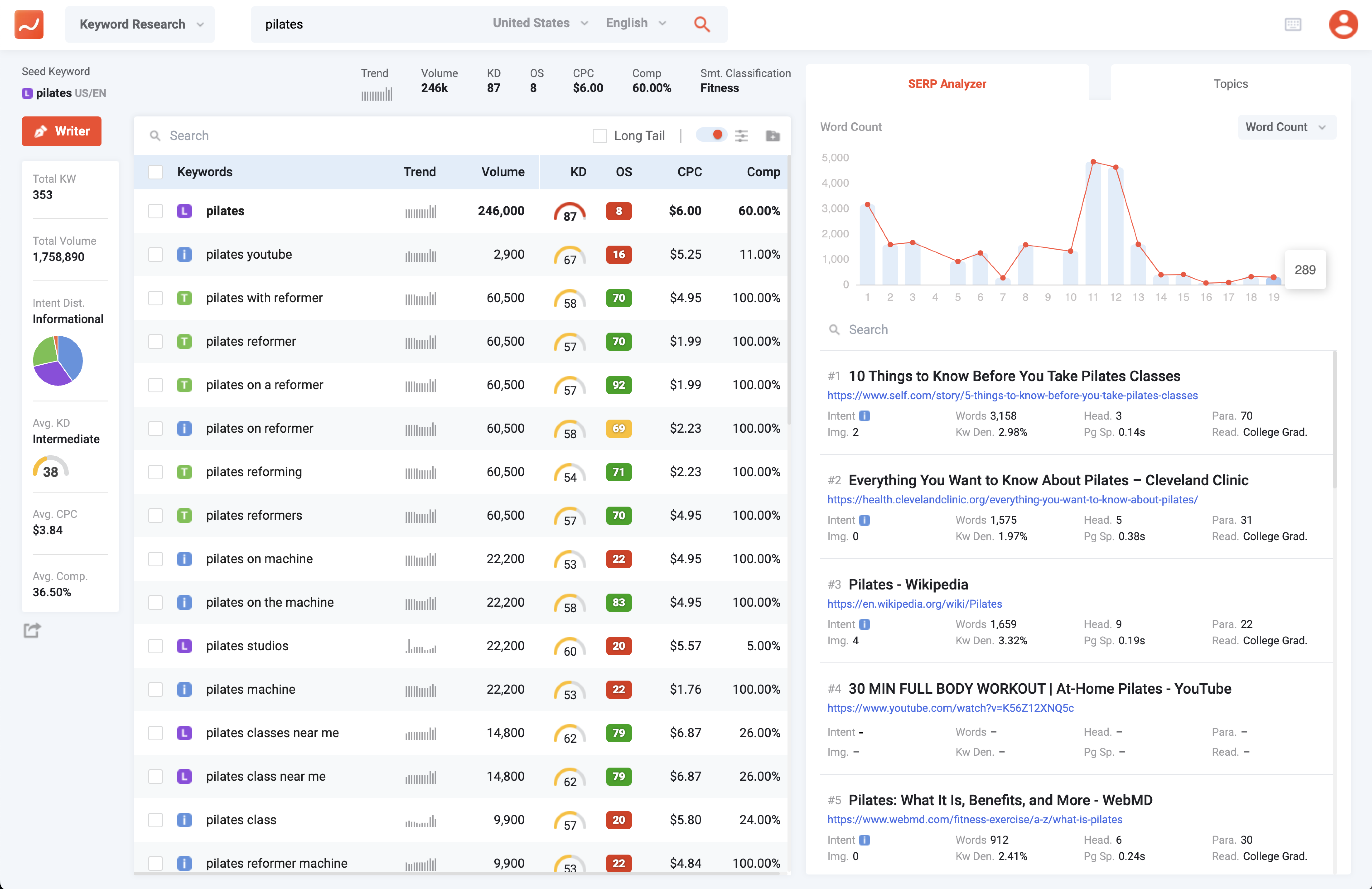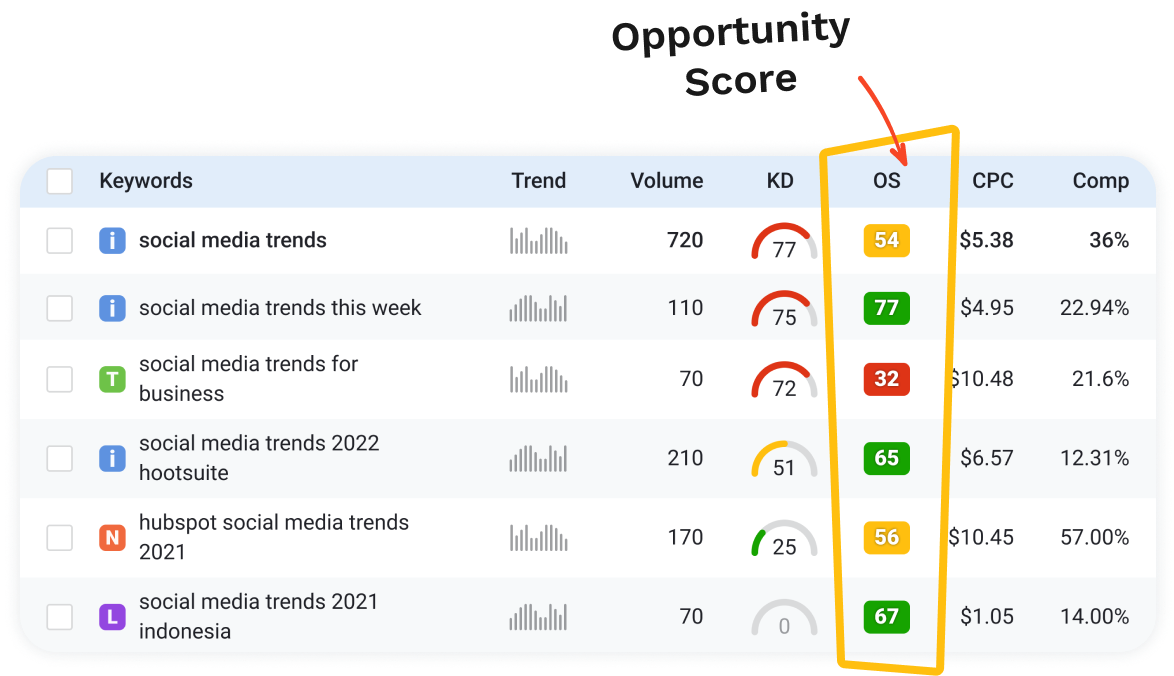Steph W. from SEOPressor


...help you check your website and tell you exactly how to rank higher?


83
score %
SEO Score

Found us from search engine?
We rank high, you can too.
SEOPressor helps you to optimize your on-page SEO for higher & improved search ranking.
By claire on January 20, 2022
SEO keywords are vital to building high-quality content. Plus, you can get to know your target market better and give you valuable search data. Simplify your keyword research process now with an SEO keyword generator.
Whether you’re a big business trying to dominate the competition or an SEO agency working with small businesses, finding the right keywords is essential for improving a website’s rankings. Keywords and SEO are directly connected to running a successful search marketing campaign.
However, sometimes this work is not easy, especially when you started off from a blank canvas.
Getting the right SEO keywords is a delicate process involving trial and error, but the basics are easy to understand. This article will show you all the information needed to find the relevant keywords for your content marketing.
We will also show you how you can save time using a keyword generator. Let’s get started today!
“Keyword” is a popular term that we’ve all heard. If you’re new to SEO, you might be confused about what keywords are and why they’re so important.
SEO keywords are the words and phrases in your content that make it possible for people to find your site via search engines. They are what your readers type to search for in the search engines.
In fact, according to Zero Limit Web, the first 5 organic results in the SERPs account for 67.6% of all clicks.
When you align your content creation and optimization with the words, topics, products, and services your target audience is looking for, you have a better chance of showing up in the search results.
It’s true that SEO has many more elements than a keyword, but it arguably plays the most essential role throughout the process.
You need to know how people are looking for your products, services, or information and make it easier for them to find you. Otherwise, they’ll land on one of the many other pages in the Google results.
To drive search engine traffic, whether, through organic search or paid search advertisements, you need the right keywords. Do you know that 15% of all Google search terms have never been searched for before?
While we certainly can’t optimize for that 15%, what we can do is to ensure that we show up for the rest of the 85%.
To rank for that 85%, you need to help the search engines understand what your page is about.
For example, if a blog post has a title tag with the keyword “best coffee shop,” and a list of the best coffee shops in your city, it is telling search engines that it’s a relevant page to show for people looking for a coffee shop in your city.
As a result, SEO keywords give you a better chance of showing up in the search results.
When creating website content, you need a tool that can help you write the most relevant content. An SEO keyword generator is one of these tools since it automates the keyword research process and shows you all the keywords that you should use in your content.
An SEO keyword generator is a tool that helps you come up with more keyword ideas based on exact match keywords and phrases. Some tools also show data like search volume and trends to help you analyze the effectiveness of keywords.
A keyword generator has a number of great features that give you information to do SEO better. For example:
What do these data mean?
A good keyword generator can also help you find new trending keywords before the competition as their keyword suggestions are constantly updated based on search trends and topic popularity.
There are several SEO keyword tools that you can use to find keywords related to your business, both free and paid. To determine which you should use, you should consider which features you’ll need and your budget.
To help you shortlist the best tools, we introduce you to our 3 favorite generators: LSIGraph, BiQ and RankingGap. Let’s see what you can do with these SEO keyword generators.
LSIGraph is a powerful tool to help you easily find semantic keywords to use for your content. Semantic keywords are contextually-related keywords like synonyms, co-occurring terms, or implied words that you can use to increase your keyword density without falling into the trap of keyword stuffing.
LSIGraph is one of our favorite keyword research tools due to how simple and intuitive it is to use, even for users with little SEO knowledge.
Just enter your seed keyword, choose your search location and language, and wait for the result. LSIGraph returns a list of semantic keywords you can use in your content.

LSIGraph displays the important metrics for each of the keywords including its search volume, difficulty, cost-per-click, and competition.
What’s unique about LSIGraph is their proprietary Opportunity Score which evaluates the keywords and tells you which ones you can rank for with the least amount of effort.

BiQ allows you to conduct SEO keyword research in over 50 languages with long-tail key phrases and keywords. All these words are linked semantically to your main keywords. You only need to enter a single seed keyword for BiQ to generate numerous long-tail keywords.
BiQ’s features include keyword intelligence, content intelligence, rank intelligence, and rank tracking, which helps you conduct local SEO and decipher customer behavior through keyword intent analysis.
As a result, you can also easily use BiQ to discover the ranking content and search snippets you should be targeting.
This keyword gap analysis tool can identify specific keyword gaps against your competitor. In the end, you can establish a laser focus strategy to reduce the gap and outrank them.
RankingGap isn’t just a keyword research tool but also a rank discovery tool. You can have a massive list of common (keywords you share with your competitors), missing (keywords you don’t have but all your competitors do), and unique (keywords only you have) views.
You might wonder what you need to do after finding out your list of relevant keywords. Now you can make these SEO keywords work for your content and get SEO results like search-driven traffic, conversions, and so on.
Based on metrics and data from tools (such as CPC, volume, competition, latent semantic value, etc.), you can sort out the most valuable keywords for you.
Read more about search volume here: What is a Good Keyword Search Volume? The Ultimate Guide
Then, keyword grouping is a step you must apply here to get the best use of these keywords. By dividing your keywords into small, manageable groups of related keywords, you’ll cut down on your workload.
To kick off this process, you can start thinking about the topics you want to rank for in generic buckets. About 5-10 topic buckets, essential to your business, are enough for you. Each of those topic buckets will have your related keywords.
On the one hand, SEO best practices recommend that you include relevant keywords in a number of high-attention areas on your site, these are places like titles, headings, URL, and more.
For a more comprehensive list of where to use your SEO keywords, here are our suggestions:
However, do not spam your keywords every part and do not force these words into your content.
So now you have learned basic information about SEO keywords. Using the right SEO keywords can help you communicate with the SERPs and rank higher. You can also catch your target audience and gain more traffic to your sites. Although the finding keyword process can be complicated, an SEO keyword generator is vital for you to do online marketing work.
Remember that choosing the correct keywords is essential for a blog to succeed, but this is just one of the aspects to work on, and you cannot neglect other important factors. Be sure to re-evaluate these keywords every few months — once a quarter is a good benchmark.
Updated: 13 February 2026


Save thousands of dollars (it’s 100x cheaper)

Zero risk of Google penalty (it’s Google-approved)

Boost your rankings (proven by case studies)
Rank High With This Link Strategy
Precise, Simplified, Fast Internal Linking.
